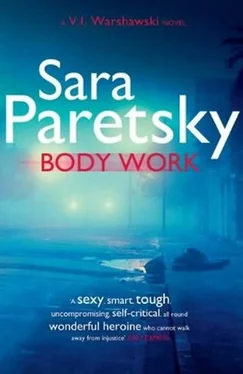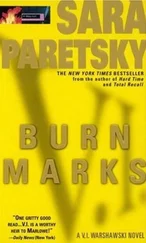Vishneski sighed heavily. “I read his blog, of course I did, but I never printed them out. You think, with a computer, it’ll always be there. So, no, I don’t remember, except he was trying to give first aid to these guys who had phosphorus burns on them. And I think that’s when he really started to fall apart, he felt so helpless. Helpless! I felt so goddamn helpless myself.”
His voice suddenly cracked. “I called him every day. I could tell he was hurting and I couldn’t get anywhere near him to help. That’s why that prison hospital just about did me in. At least now I can sit with him. Believe me, I am real grateful to you for making that happen even if you can’t figure out why someone framed my boy for killing that woman. I went over and played my clarinet for Chad for an hour, even though I expect the other patients thought they were hearing a cat being tortured.”
It was a gallant effort on his part not to break down on the phone.
“Bet if you played like Larry Combs, Chad wouldn’t know it was you, would he?”
He gave a little laugh. I thanked him for the tulips before he hung up. Another gallant gesture on his part.
I lacked the computer skills to figure out what had happened to Chad’s more recent blog postings, and I haven’t found a reliable computer forensic expert yet. I used to turn to Darraugh Graham’s son, MacKenzie, but he’s working in Africa these days.
I wandered restlessly around my living room. I dug through my old LPs until I found Edwin Starr’s 1972 album with “War” on it. It ain’t nothing but a heartbreaker / Friend only to the undertaker. I didn’t realize how loudly I was playing the cut until my phone rang. Jake Thibaut was calling to say he’d tried knocking on my door, but I hadn’t heard him over the music.
“How come you’re having a party and didn’t invite me?” he demanded. “This sounds like sex, drugs, and rock ’n’ roll.”
I lifted the phonograph arm from the turntable.
“Rock ’n’ roll. You could come over and add the sex and drugs, if you’d like.”
When he came to my door holding a bottle of wine, I tried to keep up a light tone, but Chad’s blog postings and John Vishneski’s anguish lay heavy on my mind.
“Web pages are disappearing all around me,” I said. “I wanted to look again at the Body Artist’s site, but she’s taken it down. And now I can’t read Chad’s blogs, either.”
Jake Thibaut read the postings over my shoulder.
“Maybe you can track down this guy Jesse Laredo that he mentions. It sounds as though they were close. They might have kept in touch.”
“Now, that gets you the biggest smooch in Chicago,” I said. “First good idea I’ve had all day, and I didn’t even think of it myself.”
I put Starr’s Involved back on the turntable while Jake poured some wine. It made me feel young again, the wine, the black vinyl spinning on the turntable, though I have to admit Jake’s cabernet was better than what I drank in college. And adult sex was so much better than teenage fumblings that it almost made up for growing older.
In the morning, after Jake left for his first student of the day, I lost some of my optimism. I tracked Jesse Laredo down at his mother’s home in Albuquerque, but Jesse had died five months ago. His wounds had taken too great a toll on his heart, his mother said.
I commiserated with her, and told her some of the details of the trouble Chad was in.
“Jess loved Chad. I sure am sorry to know he’s having problems,” she said after I explained why I was calling, “but you’ll never make me believe he murdered anyone.”
“When Chad lost his unit on the road to Kufah, did he call or e-mail anything to Jesse?” I asked. “I’m trying to find the blog postings he put up then. And the ones he’s done this year. Maybe Jesse printed them out.”
She promised to look, although she said that Chad always tried for a light tone when he wrote or phoned her son. “He knew Jess was hurting bad, and he knew Jess felt like he was letting his unit down, not being in Iraq with them. But I’ll see what I can find.”
I thanked her, but my hopes weren’t high. Nothing was coming easy in this case. The thought of all the dead and walking wounded from that pointless war was heartbreaking.
You’ve got nothing to complain about, V.I. Get back in the trenches!
I made another cup of coffee and called the people whose names Tim Radke had given me last night, but none of them could tell me anything. The guys had all been part of their post-deployment counseling sessions at the VA, but none of them ever remembered Chad opening up about what happened on the road to Kufah. The therapist actually took my call on the first try, but she didn’t even remember Chad’s name until she’d looked him up in her files. She told me she needed to see his parents’ signed release before she could talk to me, but she waited while I faxed it to her.
“I see so many men that I can’t keep track of them all,” she apologized. “A lot of them are angry. I’m sorry to hear that Chad Vishneski got in trouble with the law, but frankly, we’re seeing it more and more.”
After looking through her file, she said Chad had never shown up for the one private meeting he’d scheduled.
I rubbed my forehead, frustrated, trying to come up with anyone who could talk to me about Chad or Nadia or Alexandra. Finally, I decided to put on my business clothes and return to the northwest suburbs.
24 Inside Fortress Tintrey
Tintrey’s corporate offices were only a quarter mile from Glenbrook High, as if Jarvis MacLean wanted to remind his alma mater how successful he’d become. MacLean had built his complex in the middle of a landscaped industrial park. Rustic bridges crossed the obligatory water feature, bits of shrubbery poked through the snow, and the walkways that surrounded the building and led into the parkland had all been shoveled and salted.
I parked in the lot in the same row where senior staff seemed to park, judging by the array of BMWs, Mercedeses, and Land Rovers. Nothing as cheap as a Buick. I paused behind a green E-Type Jaguar. Even in this weather, its body was clean and polished, not a mark on it. If Warshawski Enterprises ever got to be as successful as Tintrey, I was getting me one of those. Right after my corporate jet and all those other goodies.
I sighed wistfully but squared my shoulders and walked into a lobby that made no secret of Tintrey’s success. Unlike Anton Kystarnik, whose dingy building seemed designed to show the IRS that he had no assets, Jarvis MacLean had built to proclaim success to his prospective customers. Well-kept plants were potted around the entryway, along with a couple of sculptures of the kind my leasemate created-big abstract pieces of twisting steel and high-gloss wood.
A pair of receptionists, so highly polished I could almost see my face in their cheekbones, staffed a high rosewood counter. They were dressed in powder-blue blazers with TINTREY embroidered on the breast pockets. Behind them, electronic gates blocked access to the building’s interior.
On the far side of the gates, open glass-and-metal staircases invited you to walk to the upper floors. The elevators were along a far wall, but their doors were drab. A green architect clearly had been involved in putting the building together.
“May I help you?” one of the gleaming receptionists asked.
I produced a business card and asked to speak with someone in Human Resources. “I’m doing a background check on a woman who says she used to work here.”
The receptionist murmured into her telephone and then asked who was “the subject of my inquiry.” We fenced for a minute-me explaining that it was a confidential inquiry, she explaining that she was trying to save me time. In the end, she directed me to the third floor, where Belinda would see me. We smiled widely at each other, which made me very aware of my caffeine-stained teeth, and she pressed a switch that let me through the magic gates.
Читать дальше












